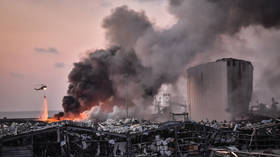‘External interference through rocket, bomb or other act’ possible cause of Beirut blast – Lebanon’s president

Lebanon’s president has not ruled out the possibility that a series of powerful explosions in the Port of Beirut were caused by a rocket or bomb. The authorities previously stated that the ammonium nitrate stash had detonated.
“The cause has not been determined yet. There is a possibility of external interference through a rocket or bomb or other act," Aoun said, as cited by local media.
Aoun said that the probe into the blast will check whether it was caused by “negligence or an accident,” or some type of external force.
The president promised that everyone responsible for the explosions will be held accountable.
Also on rt.com The cargo that blew up Beirut: Sailor REVEALS troubled history of doomed ship that brought TONS of explosive fertilizer to LebanonOn Tuesday, two massive explosions rocked Beirut, killing at least 157 people. The powerful shockwave caused war-like devastation across several city blocks around the port area, displacing over 300,000 residents.
Speculation immediately arose online that Lebanon’s neighbor Israel or militant group Hezbollah could have been behind the blasts. However, both Tel Aviv and Hezbollah quickly denied any involvement.
Initial reports suggested that the explosions were triggered by a blaze at a fireworks depot. Lebanon’s Prime Minister Hassan Diab later confirmed that around 2,750 tons of ammonium nitrate, a highly explosive substance used in fertilizer and bombs, had detonated at the port’s warehouse. The hazardous chemicals were confiscated from the Moldovan-flagged Russian-owned cargo ship MV Rhosus in 2014.
Think your friends would be interested? Share this story!














